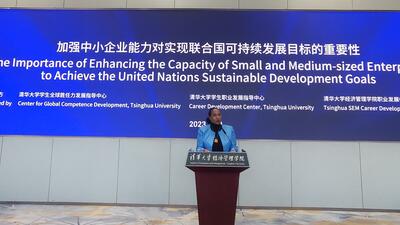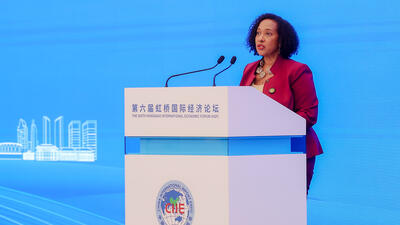
Stronger small businesses for the UN SDGs
(Beijing, China) Executive Director Pamela Coke-Hamilton addresses students at the Tsinghua University on the importance of enhancing the capacity of small and medium-sized enterprises to achieve the United Nations sustainable development goals.
Hello everyone and welcome! I’m excited to be here with you all today, and grateful to Tsinghua University for the invitation to share a few thoughts and reflections. My own university years were among my happiest, and every time I have a chance to meet and interact with students, I find that I leave there inspired and hopeful for what’s possible.
Now, I want to start my remarks by telling you a story.
Picture this: in Kenya, a woman named Irene Mumo runs a small company called Trueways Enterprises, and among her products is a line of beeswax moisturizers that have antibacterial and anti-inflammatory properties, among other benefits. But she was having trouble getting these moisturizers onto international markets—until she came here, to China, for the China International Import Expo five years ago with ITC’s help.
This trip was a gamechanger: Irene connected with a Chinese branding agency that helped her figure out how to market her moisturizers for consumers here, and from there she was able to do research to hear what different people needed most from her products. Connecting to social media platforms like WeChat also gave her marketing efforts even greater reach and affirmed that there was strong demand for these high-quality, environmentally-friendly products in China.
Back home, this demand has led to more jobs and better incomes for other women beekeepers in Kenya, as Trueways Enterprises is now expanding its work to include other products made from beeswax. This isn’t just to respond to the growing demand for their excellent work: they’re doing this to help show that bees are essential for biodiversity, and we must protect bee populations not just for the products they provide, but for their environmental benefits. And in the meantime, Trueways Enterprises’ relationship with Chinese partners and the Chinese market continues to grow, year on year.
This is a true story, and it is one that reflects some of the daily realities that many smaller businesses face in countries around the world, along with the benefits to economies, the environment, and society if these same businesses are able to access and compete on new markets.
The story of Irene and Trueways is also a testament to the importance of the China International Import Expo, the largest event of its kind in the world. It also showcases the impressive opportunities available here in China for MSMEs globally, given China’s role as the world’s second-largest importer and consumer. We’re immensely grateful at ITC to have been an official partner of CIIE since 2019, and to have had the chance to bring hundreds of small businesses to China over the years so they can forge similar connections to what Irene and Trueways were able to achieve.
This year, we’ve brought 65 companies from economic sectors ranging from agriculture to consumer goods to China, so that businesses from Africa, Asia, Latin America, and the Caribbean can meet potential buyers, explore export opportunities, and expand their networks. We’ve helped them match with potential Chinese partners, and to help them make the most of their trip, we provided them with dedicated training in advance. I’m delighted to have attended this year’s CIIE personally, and deeply impressed by what I’ve seen and heard this past week.
These initiatives matter, especially as MSMEs worldwide navigate hurdles large and small in getting their goods and services to international markets. Some of these entrepreneurs go to work every day in settings affected by conflict, or where climate change is affecting their ability to grow the crops they need to support their families and grow their businesses. They may not have reliable internet access, which cuts them off from potential business partners, and means that they miss opportunities to learn new skills that can help them access new markets. There may not be reliable infrastructure for them to transport their products across borders, or there may not be laws, regulations, and networks in place that can help ensure women and young people are able to pursue their business goals effectively.
Why does this matter? Because ninety percent of the world’s businesses are small and medium-sized enterprises, and these firms are responsible for nearly two-thirds of the world’s jobs. We need these smaller businesses to thrive if we are to achieve the future we want as a society. And we need more young people and women starting, running, and leading these businesses. The good news is that we have a roadmap for what this future looks like and what it takes to get there.
So today, I want to talk to you about why we need more small businesses, like Trueways, to have the capacity to compete on international markets and contribute to what we call the Sustainable Development Goals, or SDGs.
First, I’ll set the stage for what these goals are and how they work. Second, I’ll tell you about how we’re approaching those goals at ITC as we work to help small businesses engage in international trade. Third, I’ll explain why we also need systemic change if these small businesses are truly going to be in a position to help us achieve the SDGs, and then I’ll conclude with some of my own reflections of what you all can do to help make this happen as you embark on the next phase of your careers.
Eight years ago, United Nations member states adopted a wide-reaching plan focused on “transforming our world.” The idea was that you couldn’t fix a single problem on its own: you had to look at the whole picture of how the world works, see how it was all interconnected, and go for the big-picture solutions.
That meant that you couldn’t tackle poverty if you didn’t also try to fix gender inequality, and you couldn’t tackle climate change unless you also tried to change the way we produce and consume so that it caused less harm to our planet. You couldn’t dream of ensuring decent work and economic growth unless you thought about the environmental impacts of everything we do, and how jobs and livelihoods have ripple effects across communities and societies.
In other words, the challenges we face are deeply intertwined—and we have to tackle them all together if we’re going to achieve the future we want.
UN member states ended up with 17 goals, which we now call the Sustainable Development Goals. By now, it may not surprise you to hear that we’re pretty far off from where we have to be if we’re going to achieve the type of world that we want to leave for our children, and for future generations. And we’re running short on time: the deadline to deliver these goals is 2030, just seven years from now.
But when I come to places like Tsinghua University and see students like you committed to helping the world change for the better, this gives me hope that we can still turn things around. And when I hear stories like the one I just shared with you about Irene and Trueways, I am inspired by what small businesses can teach us and what they can achieve.
At the International Trade Centre, our contribution to the SDGs is by working with small businesses as they realize the goal of connected, sustainable, and inclusive trade. To get closer to that goal, we’ve set up what we call four “moonshots” to help us push harder and go farther, namely in the areas of green, gender, youth, and digital. We’re supporting women and youth as they lead and own their own businesses, helping ensure that smaller enterprises can make the most out of the digital technologies on offer, and supporting these firms as they work on greening their practices.
The good news: we’re making progress, and we’re learning every day at ITC about what works well, and in what contexts. But as the past few years have shown us, crises can come when we least expect them, and we have to always be prepared for new challenges that might be on the horizon—from the impacts of a changing climate to the outbreaks of conflicts.
At a time when many of the businesses we work with are living with fragility, we’re adapting our own approach to figure out how we can best support them. Later this month, we’re launching the next edition of our flagship publication, the SME Competitiveness Outlook, which looks specifically at small businesses in fragile and conflict-affected contexts and what they need to thrive.
This work is not easy, and lasting change is a slow process, one that is far from linear. But every day I come to work and I see people ready to try, and try again, to make that change possible. I see entrepreneurs, like Irene from Trueways, that are daring to try new things, visit new environments, and learn new skills to help grow their businesses and create more opportunities for the people in their communities. I meet policymakers who are deeply committed to changing how the global trading system works, even when these ideas may make them unpopular.
The current rules of the road of the multilateral trading system don’t factor in the impacts of these rules on climate change, on gender equality, on social cohesion, on food security, and so many other aspects of what we now call the Sustainable Development Goals. I was there when those rules were written: I know what they could have been. And from what I see from our efforts at the International Trade Centre daily, as we work to help smaller businesses trade and compete at the international level, it’s ever more apparent that we can’t afford to keep tinkering on the edges of problems: for small businesses to thrive, they need a system that prioritizes their needs and accounts for the world we live in.
As you finish your time at Tsinghua University and prepare for what comes after, I want to ask you to keep an open mind, be willing to try new things, and remember that the work you’ll go on to do has the potential to change lives.
You may end up working for your country’s government or leading a private sector company. You may end up staying in academia, or even starting a small or medium-sized business of your own. Or you may, as so many people now do, lead multiple careers over your lifetime, finding different ways to make a contribution to a better world.
When I left university, little could I have imagined where life would take me. As you may know, I got my first degree at the University of the West Indies in international relations, back in my home country of Jamaica. After several years as a trade negotiator, I then studied law at Georgetown University in the United States. The career that followed has gone beyond what I could have dreamed of, and it’s taught me so much: I’ve worked at the Organization of American States, served as the head of my home region’s export development agency, and am now fortunate to lead the ITC, to give a few examples.
And I never forgot how formative the university experience can be: at one point, I was able to work with the UWI Cave Hill Campus in Barbados, helping put together the Master’s in International Trade Policy program that they still run to this day. I’m thrilled to see what it’s meant for students over the years, and excited to hear from you about your own studies and what they’ve taught you.
Every job has taught me something different, but what they’ve all had in common is that they’ve been about service, about people, and about sustainable development. I’m a hands-on person, and I’m grateful to have a job where I can go out into the world, see what real change looks like, and work with committed people who are doing everything they can to ensure that change delivers for small businesses and the SDGs.
Just weeks ago at ITC, we held an Innovation Fair where colleagues from across our agency came together to test out new ideas, both for how we work and for what we do, so that we are in a better position to help micro, small, and medium-sized enterprises engage in the global economy and contribute to the 2030 Agenda for Sustainable Development.
I left that Fair feeling energized by what my colleagues had shared, and inspired by their innovative spirit and their dedication to helping small businesses thrive. It also made me even more excited to meet you all at Tsinghua University, as I’ve heard great things about the innovative spirit of this university’s community. In fact, as I told my colleagues a few weeks ago, I actually prefer to call innovation “constructive deviance.” Innovation is deviating from the norm, and it’s constructive, and it’s what I’ve been fortunate to see every day when I go in to work. And what’s I wish for you as you embark on your own future careers.
Whatever path you choose to take after you leave Tsinghua University, chances are you will face a choice between “business as usual” approaches and daring to do something different and embrace innovation. I encourage you to choose the latter, and I hope that wherever the future leads you, that you can apply your creativity, your expertise, and your talents in ways that help small businesses thrive and, in turn, bring us closer to achieving the SDGs and a world that future generations will be proud to call their own.
Thank you.






